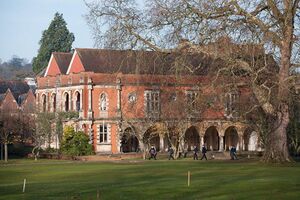Allord School
| Allord College Collegium Dominostri | |
|---|---|
 | |
| Location | |
Allord , Enley | |
| Information | |
| Type | Common boarding school |
| Motto | Latin: Dominus glorificet (May the Lord be glorified) |
| Established | 1405 |
| Abbot Principal | The Rt. Rev'd Don Stephen Galbroom |
| Chairman of the Court of Governours | Sir Alaric Reed |
| Headmaster | The Rev'd Dr. Michael Rouder |
| Staff | ca. 80 masters |
| Gender | Boys |
| Age | 10 to 19 |
| Enrolment | ca. 700 |
| Colour(s) | Black, blue & white |
| Publication | Dominus Noster |
| Former pupils | Old Dominostrians |
| School Song | Carmen Dominostrense |
Allord College is a common school for boys in Allord, Enley, Great Nortend. It is attached to Allord Abbey, a Camuvalian monastery, and was founded in 1405 to educate poor scholars. It is a fully boarding school, with an enrolment of approximately 700 boys. In keeping with its history as a school founded for the poor, 70 pupils are drawn from the region on academic scholarships known as commoners and wear gowns. 14 additional commoners attend on choral bursaries, requiring singing in choir twice daily in the college chapel. The rest of the pupils are known as freemen (likely a corruption of 'feemen'), and are fee-paying pupils.
Allord charges up to £140 per annum, with three terms in a year. It is one of the most expensive schools in Great Nortend, and is a popular choice for the sons of royalty, peers and the gentry. Over half of the valedictorians in a given year matriculate at a university, almost all at the University of Aldesey where Cholstave College reserves half of its places for the 'Old Dominostrians' of the school, although a number do attend the universities of Rhise or Limmes by special licence.
Name
Allord College was founded in 1405 by the newly crowned Charles I as the “Abbot, Governours and Commoners of the King's College at the Abbey of our Lord in the Forest' (Abbas Gubernatores et Plebeii Collegii Regis apud Abbatiam Domini nostri in Foresta). This remains the formal name of the school; however, the shortened name 'Allord College', rendered in Latin as Collegium Dominostri, is more commonly used. Other variants include the “Abbot and the King's College at Allord”, the “Abbot, Governours and Commoners of Allord College” and the “Abbot, Governours and Commoners of the King's College at Allord”, inter alia. The portmanteaux 'Allord' and Dominoster are the English and Latin names respectively of the small village which has grown up around the school and abbey.
Sport
Allord traditionally plays Green game, a sport generally only played at Allord College and by Old Dominostrians. This is played in the relevantly named 'Green Term', the autumn Hilary term. It is also sometimes known as Allord game. Stinning is played in the winter 'Great Half', and cricket in 'Summer Half'. Other sports are also played, such as rowing (Boat game), racquet, closters (Closter game), hockey and tennis (Court game).
Houses
There are nine boarding houses at Allord College, each with its own housemaster. Common House is reserved for the scholars and choristers. Freemen's houses, of which there are eight, are usually referred to by their housemaster rather than by the actual building's name, excepting Outhouse.
The houses are present called: Wickman's, Michaelson's, Estfield's, Joblac's, Rosham's, Anotton's, Secbury's, Outhouse and College.
Boys live in their house, under the supervision of a housemaster and their housekeeper, universally addressed as "Madam". From the sixth form is elected the Head Boy of the house, as well as the House Captain. Houses compete against each other in sport and games, and have traditions and customs of their own.
Notable Dominostrians
- Alexander II of Great Nortend
- William, Prince of Rhise
- William Fitzgerald, 12th Margrave of Bine and former Lord High Treasurer
- The Rt Rev'd David Coke, Lord Bishop of Lendert and Cadell
- His Ex'cy Sir Geoffrey Stallingham, Ambassadour
See also
This page is written in Erbonian English, which has its own spelling conventions (colour, travelled, centre, realise, instal, sobre, shew, artefact), and some terms that are used in it may be different or absent from other varieties of English. |
